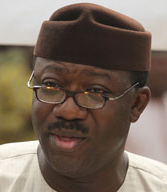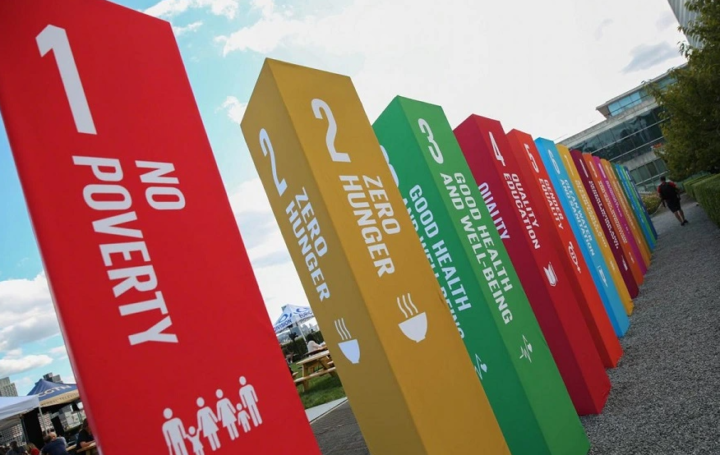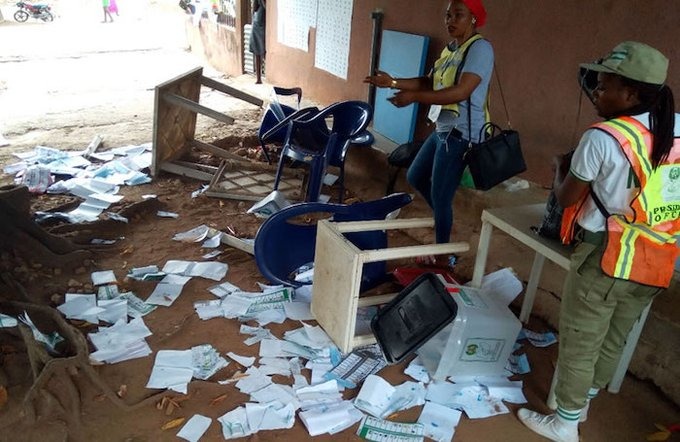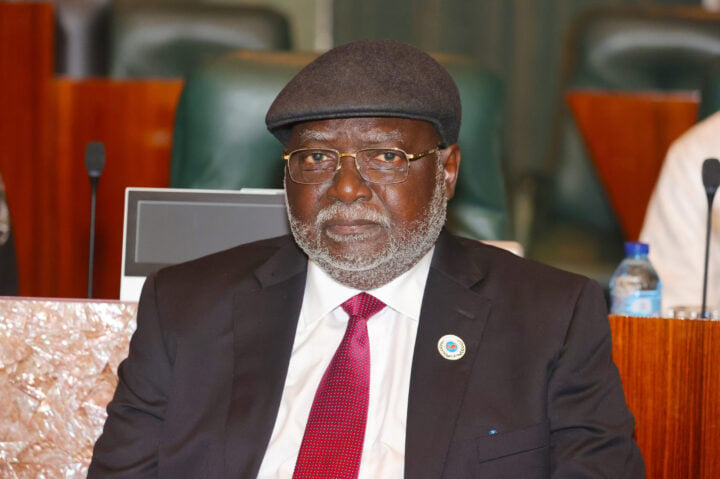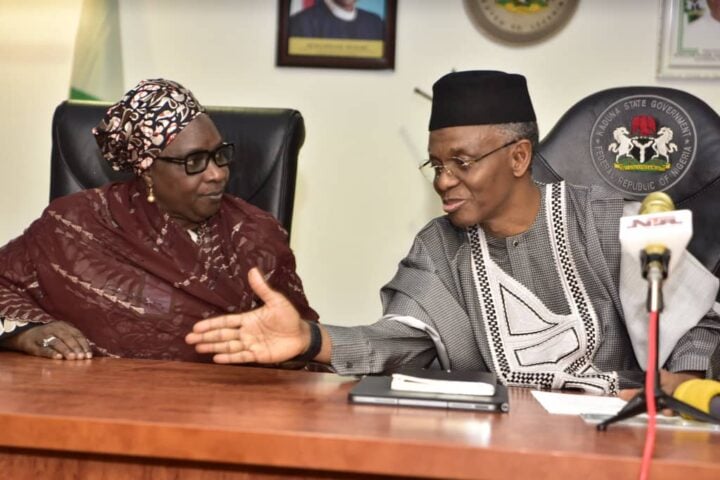I thank the organizers for the invitation to participate in this side event at the UN 2023 Water Conference which has been described as the most important water event in a generation. The 2023 UN Water Conference, organized after a 50-year hiatus since the first UN Water Conference was held in Argentina in 1977, is indeed an opportunity for us to raise ambition to support the attainment of SDG 6 targets in Africa by 2030 and present game-changing solutions for the multifaceted crises of “too much water”, such as storms and floods; “too little water”, such as droughts and water scarcity; and “too dirty water”, such as polluted water.
Inadequate quantity and quality, water is essential for all aspects of life and sustainable development. The UN Sustainable Development Goal (SDG) number 6 (Clean Water and Sanitation), not surprisingly, is a “cornerstone” goal. The achievement of clean water and sanitation is key to achieving many of the other SDGs. It is critical to sustainably managing natural resources and it is embedded in all aspects of development – poverty reduction, food security, and health – and in sustaining economic growth in agriculture, industry, and energy generation. Water is also recognized as a central plank of the green economy.
Despite the proven benefits of investing in water for development, water security – which is not only about the availability of sufficient water, but in simple terms addresses the ‘too little’, ‘too much’, and ‘too dirty’ issues of water management, is far from being realized in many countries.
The COVID-19 pandemic has uncovered critical gaps in water and sanitation services, with serious consequences for public health. This challenge is particularly acute in Africa, which has little chance of meeting SDG-6 targets by 2030. Access to water and sanitation services is very low: 30 % of the population in sub-Saharan Africa used a safely managed drinking water service by 2020, only 20% used a safely managed sanitation service, and 26% had access to hand-washing facilities. On water stress, only 6% of the renewable water resources in Sub- Saharan Africa is being withdrawn according to SDG 6 snapshots provided by UN Waters.
Advertisement
From drought in the Horn of Africa to floods in Sierra Leone, to water shortages in Cape Town and Bouake, so many people in Africa live every day with the damage done by too much or too little water. Growing demands driven by demographic changes and urbanization; reduced water availability and quality, exacerbated by climate change; the potential for conflict over water resources – all these issues mean Africa is on the frontlines of the water crisis.
Ominously, current levels of investments are outstripped by increases in population, and the number of unserved people is rising. Poor water quality is the root cause of 70–80 percent of diseases. Every hour, an estimated 115 people die from diseases related to improper hygiene, poor sanitation, or contaminated water.
Lack of access to safe water has a clear gender impact as the burden of securing water falls disproportionately on women and girls with consequences for their income and educational opportunities. Lack of sanitation also creates specific risks for women and girls’ safety.
Advertisement
While water security is key to our collective future, Africa is still deeply water-insecure. Data from the UN’s first-ever assessment of water security in Africa published by the Canada-based Institute for Water, Environment and Health in 2022, presents very sobering and worrisome results. The assessment used 10 indicators to quantify water security in Africa’s 54 countries and introduced five stages of water security: Emerging (a score of 0 — 45), slight (45 — 60), modest (60 — 75), effective (75 — 90), and model (90 — 100).
While data deficiencies loomed large, not a single country is at the highest “model” stage of water security. Except for Egypt, all countries scored below 70. Only 13 of 54 countries were found to have a “modest” level of water security, while over a third of the 54 countries had a“emerging” level water security, representing a large gap to be closed to reach an acceptable level.
Water insecurity also has links with conflicts. At the state level, Egypt, Ethiopia, and Sudan have been engaged in a continuing fratricidal dispute over fresh water in the Grand Ethiopian Renaissance Dam. Water-related conflicts are also expected to increase under climate change, as droughts which drive water scarcity, become more frequent due to erratic rainfall patterns. Communities along Lake Chad have erupted in violence as citizens, battle for limited water resources. Boko Haram has waged a violent insurgent campaign since 2010; partly as a result of the drying up of Lake Chad. In the Darfur region in Sudan, access to water was part of the regional conflict and a trigger of the humanitarian emergency there. In Nigeria’s Middle Belt, changing rainfall patterns are limiting the grazing area of herders, who then encroach on the land of farmers. Water-related violence has been responsible for more casualties than the violent insurgency waged by Boko Haram. This conflict caused the deaths of 1,078 people between the months of January and March 2018.
A major challenge has been weak governance which exacerbates these water challenges. The Organization for Economic Cooperation and Development (OECD) succinctly defines water governance as “the range of political, social, economic, and administrative systems that are in place to develop and manage water resources, and to deliver water services at different levels of society”. Many river/lake basin organizationshave been put in place in Africa and Integrated Water Resource Management (IWRM) adopted as a new paradigm for sustainable water management at national and regional levels but challenges abound in several countries, particularly in moving from the realm of policy to actual change on the ground.
Advertisement
Any role for Cities and Municipalities?
While in a majority of African countries, water policy is driven at the national level by a line ministry often in charge of most regulatory functions, including tariff setting, quality standards definitions and monitoring, and consumer protection and engagement, the last decade has seen an increasing leadership of city and sub-national governments in water policy as a recent OECD survey indicates.
Though the political, regulatory and fiscal powers of local governments vary across the continent, we believe that cities are uniquely situated to drive change at the local level in the achievement of Sustainable Development Goal (SDG) 6 on “Clean water and sanitation for all” in Africa.
Mayors and city leaders hold the key to water security. They are closer to citizens and oversee critical investments and decisions related to land use, solid waste, infrastructure, and environmental amenities. They can drive water security and promote low-cost, green, and nature-based solutions. Even where water policies remain highly centralized, mayors are taking bold actions to fix water pipes and institutions.
Advertisement
With mounting pressures on water resources from climate, urbanization, and demographic trends in Africa, more partnerships between national and local leaders are needed. Governors and Mayors in particular, now need to turn the key to unlock the development of better water policies for better lives. As many decisions affecting urban water management are taken outside the water arena and vice-versa (spatial planning, agriculture, energy, etc.), coordination is essential to ensure a whole-of-government approach through which water can become a factor for sustainable growth and contribute to the broader economic, social and environmental agenda.
The OECD and UCLG Africa joined forces to launch a new Roundtable of African Mayors for Water Security. The Roundtable which brought together more than 50 Mayors from cities of different sizes across the five sub-regions of Africa, will facilitate the design and implementation of more robust local water policies.
Advertisement
At the 9th World Water Forum that took place in Senegal in March 2022, Mayors from across the globe united to applaud this initiative and adopt an Action Plan to leverage the 12 OECD Principles on Water Governance to ensure the right to water and sanitation, foster rural-urban linkages, catalyze innovative finance, promote inclusive governance and advance cooperation for future-proof and resilient water systems.
The platform aims to facilitate the design and implementation of robust local water policies by producing granular data and evidence, sharing knowledge, experience, and best practices, and enhancing collaboration among Mayors.
Advertisement
The Case for City Basin Management
The results of the 2021 OECD Survey on Water Governance in 36 African cities, however, indicate that only 42% of cities surveyed are part of a river basin organization. In the absence of integrated basin governance systems, the mismatch between hydrological and administrative boundaries can lead to competition between water uses and hinder the effectiveness of service delivery.
Advertisement
River basin organizations are no doubt important tools for coordinating water policy at the territorial level, across sectors, stakeholders, and between levels of government. Indeed, they can be useful to manage water at the appropriate scale through integrated basin governance to reflect local conditions, foster multi-level cooperation for the management of water resources; encourage sound hydrological cycle management; and promote adaptive and mitigation strategies.
Building a “City-Basin Dialogue” is thus the surest way to move toward sustainable water management in Africa. Governors, Mayors, and city leaders, who are closer to citizens and place-based needs, could play a more significant role in addressing the mismatch between hydrological and administrative boundaries, by contributing to water resource management within integrated basin systems.
Effective multi-level governance is needed to manage water at the appropriate functional and territorial scale(s), within integrated basin governance systems, to enhance rural-urban linkages, and develop place-based solutions that reflect local conditions, as set out in the Action Plan of Mayors, Local and Regional Governments for Water Security signed by 80+ local authority representatives gathered within the OECD/ UCLG-Africa Roundtable of African Mayors for Water Security. This is the way ahead and my organization, the Forum of Regions of Africa, is pledging to ensure that this collaboration succeeds.
The Case of Nigeria
Let me briefly turn to the case of Nigeria my country, before I proffer few recommendations on the way forward.
Nigeria, in recent years, has made modest progress in expanding access to water, sanitation, and hygiene to its rapidly growing population of 209 million people – the largest on the African continent.
By 2018, a combination of inadequate infrastructure, a lack of required human capital, poor investment, and a deficient enabling regulatory environment, amongst other challenges, meant that approximately 60 million Nigerians were living without access to basic drinking water, 80 million people had no access to improved sanitation facilities, while 167 million could not access basic hand-washing facilities.
In rural areas, 39% of households lack access to at least a basic water supply, while only half have access to improved sanitation, and almost a third (29%) practice open defecation.
The Government of Nigeria strengthened its commitment to improving access to WASH services, with President Muhammadu Buhari declaring a State of Emergency in 2018 and launching the National Action Plan (NAP); a 13-year strategy for the Revitalization of Nigeria’s Water Supply, Sanitation, and Hygiene (WASH) Sector aimed at ensuring universal access to sustainable and safely managed WASH services by 2030, commensurate with the Sustainable Development Goals.
With the support of the World Bank and other development partners, the Federal Government of Nigeria has developed initiatives designed to fill identified gaps that have limited citizens’ ability to have access to safe and potable water. One of these initiatives was the National Urban Water Sector Reform Program (NUWSRP).
The NUWSRP outlined several objectives, including sector reform, water utility sustainability and commercial viability, infrastructure improvement, service reliability, and performance enhancement, and increased access to quality piped water networks in urban areas nationwide.
The World Bank listed the achievements recorded through the NUWSRP to include the construction of over 2,300 additional Water Points, and 6,546 sanitation compartments and hygiene facilities across the country; the creation of 12,435 direct and 24,870 indirect jobs since 2015; and the certification of a total of 33 Local Government Areas within nine States as Open Defecation Free (ODF).
Several challenges however remain!
Nigeria currently has no comprehensive water law. Efforts by the Federal Ministry of Water Resources to introduce the Water Bill since 2021, have been mired in controversy, especially by States that contend that the bill sought to entrench and vest the ownership, control, and management of water resources in the Federal Government.
Nigeria is currently divided into 36 states and the FCT. In the absence of a comprehensive law, each state operates with different institutional structures, power dynamics, and little or no regulatory oversight. In most states, a State Water Board (SWB) is responsible for providing water and sanitation services. On the whole, however, SWBs are hobbled by nonexistent or weak incentives for better performance, aging infrastructure, inadequate or ineffective operations and maintenance, weak institutional capacity, and little accountability to consumers.
UNICEF also recently raised concerns that an estimated 70% of water at the point of consumption is contaminated and, as a result, Nigeria has the world’s highest number of deaths from the waterborne disease among children under five years old, estimated at 117,000 children every year.
The Way Forward
To conclude, getting water security right is now a matter of urgency across Africa, where the number of water-insecure urban residents is rising. Progress on United Nations Sustainable Development Goal (SDG) 6 must accelerate with a sense of great urgency, given the pressing need for improved water and sanitation access in communities and municipalities across the continent.
Missing and patchy information stemming from incomplete, outdated, and/or fragmented data, remains a prominent obstacle to effective water policy implementation, evaluation, and monitoring. Action needs to be undertaken immediately by national governments to radically improve data collection for Africa, with support from international agents. Better quality data and monitoring and reporting of water resources will lead to an increase in knowledge, which will support the ability to make informed decisions for enhancing water security through better water resource management. Perhaps, water data availability itself should be used as an indicator in future water security assessments.
The funding gap is huge and considerable investment efforts are still required to achieve SDG 6.1.1 and 6.2.1 targets by 2030. It has been estimated that Africa will need investments of up to $20 billion a year, but countries today are allocating no more than 0.5 percent of their GDP to the water sector. A first step could be to reform water tariffs, to recover the costs of investment, operation, and maintenance of water infrastructure as much as possible. A certain proportion of the investment gap could also be covered through increased efficiency with technical losses representing from 20% to 50%, and collection ratio ranging from 80% to 95% throughout Africa. Subsidies and tariff structures must also be appropriately designed, targeted, and implemented with the objectives to achieve sustainability, equity, affordability, and the appropriate level of service for all.
The lack of capacity related to water – human, financial, institutional, technological, and service provisioning – is a major hurdle to achieving water security. As water security has social, humanitarian, economic, legal, and environmental dimensions, it requires an equally wide range of capacities and expertise that go beyond the immediate management of available water resources. Policy-makers need to identify existing capacities, as well as gaps, in order to properly address the water security challenge. Such assessments need to be undertaken at both the institutional and relevant geographical (national, river basin, etc.) levels.
Finally, an expansive and inclusive framing of water security must also emphasize the ability to manage tensions and conflicts at different levels through appropriate governance, negotiation, and the rule of law. Water security must, of necessity, reduce the potential for conflicts and tensions, contributing to significant social, development, economic, and environmental benefits.
Fayemi, the President of the Forum of Regions of Africa and former Chairman of the Nigerian Governors Forum (NGF), made this presentation on the sidelines of the UN 2023 Water Conference in New York, United States.
Views expressed by contributors are strictly personal and not of TheCable.
